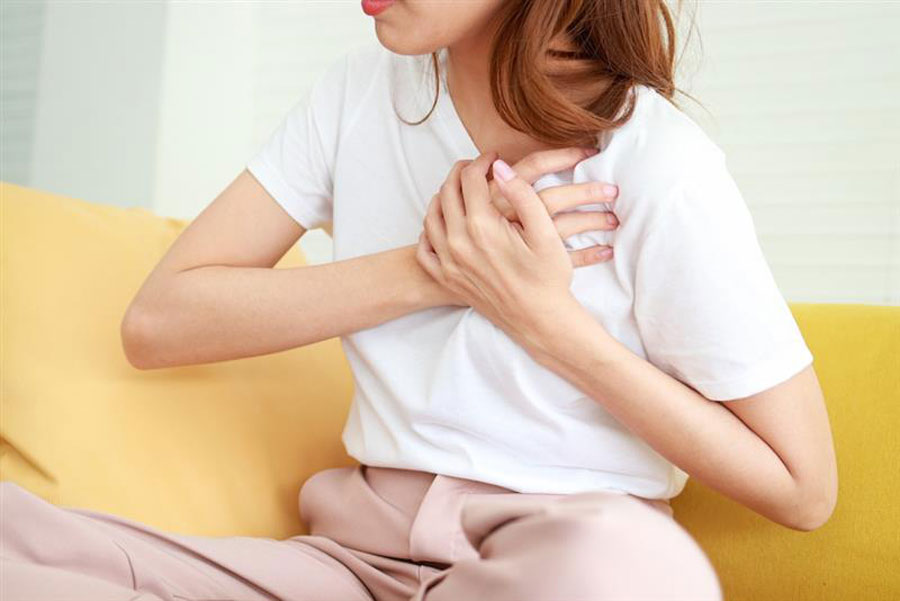
Heart palpitations, that fluttering sensation in your chest, can be a disconcerting experience, especially when they occur after a meal. While occasional heart palpitations are usually harmless, they can sometimes indicate underlying health issues. In this article, we will delve into the causes, symptoms, and management of heart palpitations after eating, drawing insights from reputable sources like the Cleveland Clinic.
The Basics of Heart Palpitations
Before diving into the specifics of heart palpitations after eating, let’s clarify what heart palpitations are. Palpitations are defined as an abnormal awareness of the heartbeat, often described as rapid, strong, or irregular. They can feel like fluttering, pounding, or even a skipped beat. These sensations may be harmless and temporary, but they can also be associated with underlying health conditions.
Common Causes of Heart Palpitations After Eating
1. Dietary Factors: Certain foods and beverages can trigger heart palpitations. Caffeine, found in coffee, tea, and chocolate, is a well-known culprit. Additionally, high-sugar and high-fat meals can lead to blood sugar fluctuations, which may trigger palpitations in some individuals.
2. Alcohol: Excessive alcohol consumption can cause heart palpitations. It can affect the electrical impulses of the heart, leading to irregular heartbeats.
3. Spicy Foods: Spicy foods may stimulate the vagus nerve, which can result in palpitations for some people.
4. Food Allergies and Sensitivities: Some individuals may experience heart palpitations as a result of food allergies or sensitivities. For example, allergic reactions to shellfish can cause a sudden increase in heart rate.
5. Overeating: Consuming large meals can put extra stress on the digestive system and lead to palpitations. The body redirects blood flow to aid digestion, which may affect the heart rate.
Symptoms of Heart Palpitations After Eating
When experiencing heart palpitations after a meal, individuals may also notice additional symptoms, which can include:
1. Shortness of breath, difficulty breathing, or other breathing problems
2. Chest pain or discomfort
3. Dizziness or confusion
4. Fainting
5. Excessive sweating
6. Unusual tightness in your arms, chest, jaw, neck, or upper back.
These symptoms may vary in intensity and duration, depending on the underlying cause of the palpitations.
Management and Prevention
1. Dietary Modifications: Identify and avoid foods and beverages that trigger palpitations. Limit caffeine intake and steer clear of overly spicy or high-fat meals.
2. Moderation: Avoid overeating, as this can strain your digestive system and lead to palpitations. Opt for smaller, balanced meals.
3. Alcohol Moderation: If you notice palpitations after drinking alcohol, limit your alcohol consumption or avoid it altogether.
4. Hydration: Staying well-hydrated is essential for overall health and can help prevent palpitations.
5. Stress Reduction: High stress and anxiety levels can contribute to palpitations. Engage in relaxation techniques like deep breathing, meditation, or yoga.
6. Seek Medical Advice: If heart palpitations persist, worsen, or are accompanied by severe symptoms, consult a healthcare professional. They can help diagnose any underlying conditions and recommend appropriate treatment.
In Summary
Heart palpitations after eating can be a worrisome experience, but they are not always a cause for concern. By paying attention to your diet, moderating alcohol intake, staying hydrated, managing stress, and seeking medical advice when necessary, you can reduce the likelihood of experiencing heart palpitations and ensure your heart health remains in check. Remember that everyone’s body is different, and it’s crucial to listen to your body and consult a healthcare professional if you have any concerns about your heart health.
Sources:
